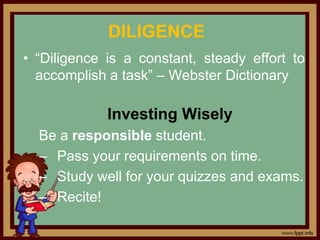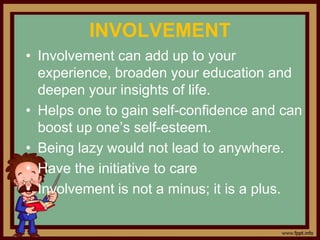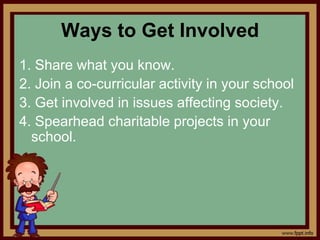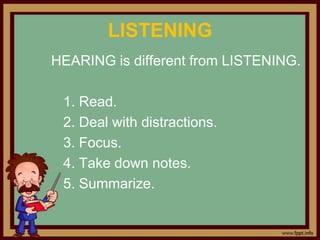How to survive college
- 1. HOW TO SURVIVE COLLEGEPsych Group 2
- 2. Setting a BalanceTo have a meaningful, relevant and practical education there must be a proper balance of some mindsets.
- 3. What Does Discipline Require?
- 4. GOAL SETTINGDefine your short term, medium and long-range targets.
- 5. STRIVING TOWARDS EXCELLENCEGOALS INTERESTS & ABILITIES WORKRemember!Excellence is not perfection. “Excellenceisnotbeingthebest, itisdoingyourbest.”
- 6. DILIGENCE-It Pays OffINTEREST-The Sustaining BaseSCHEDULING-The Time-SaverCONCENTRATION-The Focusing FactorINVOLVEMENT-The Relationship ElementPLANNING AND PREPARATION- Looking AheadLISTENING-A Rewarding SkillINTEGRITY-The Lost ValueNOTE-TAKING-The Essential HabitENJOYMENT-The Difference
- 7. DILIGENCE “Diligence is a constant, steady effort to accomplish a task” – Webster DictionaryInvesting Wisely Be a responsible student. Pass yourrequirementson time.Studywellforyourquizzes and exams. Recite!
- 8. Crafting QualityMany students rush through school works without thinking of the quality of their final output, losing the essence of learning.Learn to PersevereA good start does not guarantee a rewarding finish. Failure is not the making of mistakes; failure is giving up.
- 9. INTERESTThere are two types of interest: natural and cultivated.To be naturally keen and interested in a subject is a blessing, while to cultivate interest is wisdom and discipline.
- 10. How can you cultivate new interest?See with curiosity. Open your eyes and look around you with a searching and inquisitive mind and heart. Read, observe and inquire. Most of all, the Bible will reveal to you the mystery and the reality of God Himself.
- 11. SCHEDULING Proper time management can make the hours work for you and not against you. Calendar what you have to do.
- 12. Work out a Daily Schedule -Allot time for each listed activity that you have to do and what you want to do on a particular day.
- 13. Remember!Block PrioritiesAs a student, your priorities are your school requirements. All your class time, library time and study time should be non-negotiable and non-adjustable hours.Do not leave God out of your priorities.
- 14. Balance All PrioritiesA balanced set of priorities leads to a sound mind and a pleasant personality, so include in your schedule a controlled time for athletics and recreation. The key word in priorities is balance.
- 15. Turn time-wasters into time-saversMake use of the in-between times. Utilize your vacant period, traveling hours, grace period while waiting for a tardy friend and others.Keeping a schedule is tough. Cultivate the discipline of saving time by sticking to your schedule.
- 16. CONCENTRATIONThe number of hours is not what counts, it is how much you put into these hours. Concentration is focusing your mind.Tip: Strengthen your concentration and bridle the direction of your thoughts.
- 17. Practice the Art of Making Your Mind Behave1. Do one thing at a time.2. Set time limits and compete against them.3. Take short breaks and stave off mental exhaustion.4. Set aside a difficult problem for a while.
- 18. INVOLVEMENTInvolvement can add up to your experience, broaden your education and deepen your insights of life.Helps one to gain self-confidence and can boost up one’s self-esteem.Being lazy would not lead to anywhere.Have the initiative to careInvolvement is not a minus; it is a plus.
- 19. Ways to Get Involved1. Share what you know.2. Join a co-curricular activity in your school3. Get involved in issues affecting society.4. Spearhead charitable projects in your school.
- 20. PLANNINGANDPREPARATIONPlanning and preparation are twin cornerstones needed to succeed.Foster greater efficiency in your study performance.Steps in Daily Planning and Preparation1. List down things to do for the day.2. Prioritize and subordinate the things to do.3. Finish what you have set out to do on your day’s list.4. Draft a list of things to do for tomorrow.
- 21. LISTENINGHEARING is different from LISTENING.1. Read.2. Deal with distractions.3. Focus.4. Take down notes.5. Summarize.
- 22. INTEGRITY“There is no way to pull off cheating. You cannot lie to life. You may deceive your teacher about what you know, but you cannot deceive life. What you have not learned leaves a hole that nothing but that learning can fill and no amount of covering over can disguise.” –Edward R. Sims
- 23. You Always Lose When You Think You Have Gained Without integrity, you lose: 1. Other people’s respect; 2. YOUR self-respect; 3. and most especially, touch with God (Leviticus 19:11)Lying and deception are sins. Sin separates man from God.Integritymeans uncorrupted, blameless, honest, and consistent. –Webster’s Dictionary
- 25. Note Taking while Reading1. Read the introduction, conclusion, and summary first;2. Mark the main ideas;3. Jot down the key ideas and sub-points;4. And do NOT copy word for word.
- 26. ENJOYMENTIf you consider enjoying in everything that you do, you: 1. Do not take it as burden but rather challenges; 2. Make the most out of it; 3. Tend to use your precious time wisely; 4. Can avoid boredom and hardship; 5. And ENJOY!
- 27. “You act enthusiastic until you make it a habit. Enthusiasm is natural; it is being alive, taking the initiative, seeing the importance of what you do, giving it dignity and making what you do important to yourself and to others.” –Gordon Parks
- 28. Source:10 Keys to College Success by Edna S. Leung-Yao
- 29. THANK YOU!GOD BLESS




























